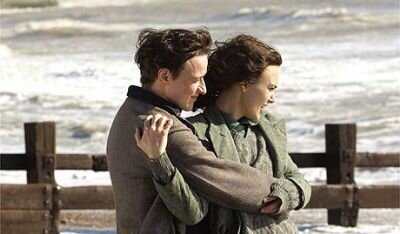|
|
| Tookey's Review |
|
| Pro Reviews |
|
| Mixed Reviews |
|
| Anti Reviews |
|
| Cast |
|
| |
 |
| |
| Released: |
2007 |
| |
|
| Genre: |
WAR
WORLD WAR II
DRAMA
ROMANCE
COSTUME
|
| |
|
| Origin: |
UK/ US |
| |
|
| Colour: |
C |
| |
|
| Length: |
122 |
|
| |
|
| |
|
|
| |
|
|
There’s a lot to admire in Joe Wright’s accomplished follow-up to his hit debut, Pride and Prejudice. I can see why many people are comparing it to The English Patient, another example of high, tragic romance based on a terrific piece of modern literature.
|
Reviewed by Chris Tookey
|
Atonement is an intelligent adaptation by Christopher Hampton of Ian McEwan’s novel, which I think is his finest work. All involved make an effort to get every period detail right, including cut-glass accents which suggest much in-depth study of Celia Johnston and Trevor Howard in Brief Encounter.
Most of the acting is first-rate, and the production values are better than you’d expect from the relatively low budget, though I did miss the book’s nightmarish image of German planes strafing the beach at Dunkirk. Wright’s elaborate tracking shot across the beach (obviously included as a less expensive set-piece to compensate) is a triumph technically, but not so successful artistically. It doesn’t progress the plot or deepen character sufficiently, and looks like the kind of arty showing-off that this director elsewhere avoids.
And whereas Pride and Prejudice was accessible enough to involve a mainstream international audience, I have my doubts about Atonement’s ability to do the same.
In a sense, Keira Knightley (pictured right) and James McAvoy (left) are the leads, and not just because they are the biggest stars: it is their doomed romance that is meant to tug at your heartstrings. But Knightley’s character, the well-born, glamorous Cecilia Tallis, is so brittle, unpleasant and snobbish at the start of the picture, in 1935, that even though she matures and softens over the years, she never fully engages our sympathy.
James McAvoy, playing Robbie, the son of a domestic (Brenda Blethyn), who has had his university education paid for by the Tallis family, is so much more likeable, that many will feel Cecilia doesn’t deserve him.
Their hopes of connubial bliss are shattered by Cecilia’s 13 year-old sister, Briony (Saiorse Ronan), who mistakenly – or perhaps vengefully, since she herself has a crush on Robbie - accuses him of raping an underage girl. Robbie is sent to prison on her unreliable testimony, and the next time we see him is in wartime, when he has been allowed out of prison to become a private. Cecilia and Robbie rekindle their romance, but he has to go off to war on the continent. Will they ever see each other again?
All this and more is lustrously photographed by Seamus McGarvey (whose other credits include The Hours) and immaculately designed by Sarah Greenwood (who also worked with Wright on Pride and Prejudice). Wright directs at a slower pace than he used on Jane Austen, but the film is always gripping and rarely fails to give an impression of forward movement.
Atonement will be a difficult movie to sell. Normally, this is the kind of film that wins acting awards; but I can’t see this doing the same. Knightley looks every inch a movie star, and the role won’t do her career any harm. But it doesn’t have the kind of range or depth that is normally required in an award-winning performance. If she does win statuettes, I suspect that they may really be delayed tributes to Pride and Prejudice. And McAvoy has the knack of making acting look easy; he seems to have the ability to “be” on screen. That is why he’s one of our best young actors. It’s also why he won’t win as many awards as he deserves.
But the central problem, and the reason why I fear Atonement will be no more than an art-house hit, is intrinsic to the original material. I remember that when I read the novel I thought it was unfilmable, and I don’t think I was entirely wrong.
The leading character – that is, the one with the most interesting character arc, and the person through whose eyes we see most of the events – is neither of the two romantic leads. She is Briony Tallis, the little girl who grows into a distinguished author but feels she has to make atonement for bearing false witness in her childhood.
The trouble is that, although her musings can easily be made central to a novel that she narrates, she is dramatically speaking an outsider, an unreliable witness who can not be party to much of the action. Also, she has to age from 13 to over 70.
This means that she has to be played by three actresses – and although the tremendous young Irish actress Saoirse Ronan has enough screen time to make a deep and favourable impression, the two older ones, Romola Garai and Vanessa Redgrave – do not. Garai has been splendid before on screen – notably in I Captured The Castle and Inside I’m Dancing – but here she seems muted and surprisingly lacking in intensity.
Add to this the accents, which are true to their period but likely to sound artificial to many modern ears, especially American ones, and you have a skilful, civilised but fatally unfocussed film that doesn’t connect as movingly or viscerally as the novel.
|
|
|
